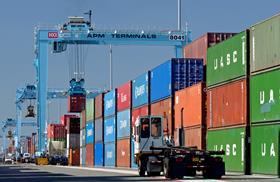
Chile’s fruit sector is facing losses in excess of US$200m after workers at the country’s largest port renewed a three-week old strike.
Port workers across Chile agreed to return to work on 26 January after three days of intense negotiations between the government, port operators and union leaders, bringing to end protests which almost completely halted much of the country’s foreign trade, including fresh fruit exports.
However, a group of workers at the Port of San Antonio downed tools again late on 27 January, blockading the port, claiming that their employers were refusing to implement the deal reached over the weekend.
The development has caused frustration among Chile’s fruit farmers and exporters who were preparing to resume exports at the peak of the Southern Hemisphere season. Speaking at a press conference in Santiago, Cristián Allendes, president of the Chilean federation of fruit producers Fedefruta, said between US$1m and US$2m worth of fruit is being delivered to the ports each day and the renewal of the strike will lead to holdups.
Refrigeration capacity at the Port of Valparaiso, 60km north of San Antonio and the main alternative shipment point for fresh fruit, is already near capacity.
The latest delay will endanger the strong relations enjoyed by Chile’s fruit exporters with supermarkets in Asia, Europe and North America and lose it valuable contracts, warned Ronald Bown, president of fruit export association Asoex.
“The impact this creates abroad are unimaginable and unmanageable…The lack of confidence in Chile is growing and it’s becoming more difficult to win back these clients,” Bown said, noting that supermarkets were switching to alternative suppliers who would fight to protect newly-won market share. At this time of the year, the worst affected products include blueberries, grapes and peaches.
Speaking last week from the World Economic Forum in Davos, Switzerland, Chilean Finance Minister Felipe Larrain warned that the strike could affect the country’s economic growth and government finances.
With the fruit industry now desperate to resume exports, the sector is considering taking more radical measures to bring the situation under control.
Patricio Crespo, president of agricultural association SNA, said that these could include calling on the government to use state security laws to reopen the ports. The authorities should also revise the contract with port operator Puerto Central to see if the terms of its concessions had been breached.
“They are clearly that they are not providing the service for which this part of the port was granted in concession,” he said.
Fedefruta is also considering taking the port operators to court over the losses the industry has suffered as a result of the strike, Allendes commented.



